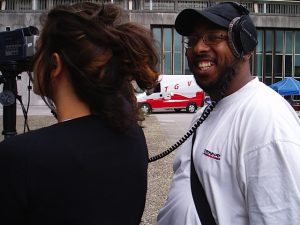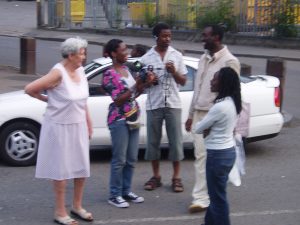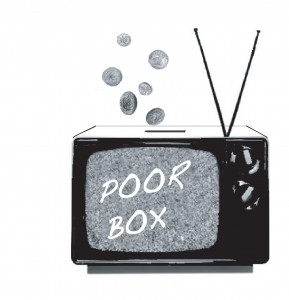Spectacle has a long history of establishing and supporting participatory community media workshops and a large number of our productions have adopted participatory video (PV) techniques and ethos, resulting in an excellent track record of high quality, award-winning TV documentaries, short films and powerful campaigning videos. We are happy to inform everyone interested in applying a participatory media approach into their community based projects, that it is now possible to share Spectacle’s experience taking part in our Participatory Video Workshop (PVW).
Spectacle has made extensive use of Participatory Video as a successful strategy to involve communities in production processes, allowing people to produce knowledge about themselves rather than being represented – and often misrepresented – by outsiders.
Recently one of the films that Spectacle produced through participatory techniques has been re-screened on the Pepys Estate: “Poverty and the Media: the tower”. The film shows the way in which local residents have felt misrepresented by the BBC ’s program The Tower: A Tale of Two Cities. The BBC’s program intended to document the transformation of the Lewisham council estate into a chic development and the alleged clash between rich newcomers and poor long term residents. Spectacle, was commissioned by the Rowntree Foundation to develop a participatory video project in the Pepys and other estates in the area: “Poverty and participation in the Media“. At the time the BBC project begun, Spectacle was already organizing video workshops that focused specifically on the way mainstream media (mis)represent poverty. In our film Pepys residents have filmed each other while commenting on the effects the BBC’s program had on their lives. Spectacle’s “Poverty and the media: the Tower” illustrates the advantages of a participatory approach, highlighting the local dynamics in a way that is factually accurate and respectful of people’s feelings, intentions and views on the world they experience.
Following the very positive feedbacks from residents and in order to meet the growing demand from community based researchers to be trained to lead participatory projects, we are happy to inform you that we are now offering a Participatory Video Workshop (PVW). Our PVW is addressed to social workers, NGOs’ and charity organization’s staff that are engaged in community development and empowerment, artists and, in general, anyone who wants to integrate participatory methods in their own projects. Based on our long experience, the PVW will provide you with practical and transferrable knowledge on video techniques, and train you on how to engage your stakeholders in participatory productions.
The PVW is designed as 3 day immersive experience that will allow you to use participatory methods in documentation, evaluation and research. If you and your staff are particularly interested in specific topics, we are happy to bring our workshop to you and tailor it to your specific needs.
Please, find here our workshop description or get in touch for further information.





